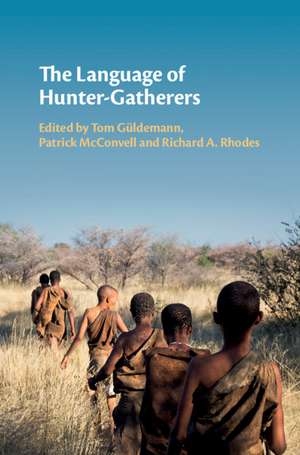The Language of Hunter-Gatherers
Editat de Tom Güldemann, Patrick McConvell, Richard A. Rhodesen Limba Engleză Hardback – 26 feb 2020
| Toate formatele și edițiile | Preț | Express |
|---|---|---|
| Paperback (1) | 339.58 lei 3-5 săpt. | +42.93 lei 6-10 zile |
| Cambridge University Press – 14 dec 2022 | 339.58 lei 3-5 săpt. | +42.93 lei 6-10 zile |
| Hardback (1) | 1032.55 lei 3-5 săpt. | |
| Cambridge University Press – 26 feb 2020 | 1032.55 lei 3-5 săpt. |
Preț: 1032.55 lei
Preț vechi: 1200.64 lei
-14% Nou
Puncte Express: 1549
Preț estimativ în valută:
197.60€ • 214.57$ • 165.99£
197.60€ • 214.57$ • 165.99£
Carte disponibilă
Livrare economică 02-16 aprilie
Preluare comenzi: 021 569.72.76
Specificații
ISBN-13: 9781107003682
ISBN-10: 1107003687
Pagini: 742
Dimensiuni: 155 x 235 x 36 mm
Greutate: 1.27 kg
Editura: Cambridge University Press
Colecția Cambridge University Press
Locul publicării:New York, United States
ISBN-10: 1107003687
Pagini: 742
Dimensiuni: 155 x 235 x 36 mm
Greutate: 1.27 kg
Editura: Cambridge University Press
Colecția Cambridge University Press
Locul publicării:New York, United States
Cuprins
Part I. Introductory Chapters: 1. Hunter-gatherer anthropology and language Tom Güldemann, Patrick McConvell and Richard Rhodes; 2. Genetic landscape of present day hunter-gatherer groups Ellen Gunnasdóttir and Mark Stoneking; 3. Linguistc typology and hunter-gatherer languages Balthasar Bickel and Johanna Nichols; 4. Ethnobiology and the hunter-gatherer/food-producer divide Cecil Brown; Part II. Africa: 5. Hunters and gatherers in East Africa and the case of Ontoga (Southwest Ethiopia) Mauro Tosco and Graziano Savà; 6. The Khoe-Kwadi family in Southern Africa Tom Güldemann; Part III. Tropical Asia: 7. Hunter-gatherers in South and Southeast Asia: the Mla-Bri Jørgen Rischel; 8. Languages in the Malay Peninsula Niclas Burenhult; 9. Language in the Andaman Islands Juliette Blevins; 10. Historical linguistics and Philippine hunter-gatherers Lawrence A. Reid; 11. Hunter-gatherers of Borneo and their languages Antonia Soriente; Part IV. New Guinea and Australia: 12. The linguistic situation in near Oceana before agriculture Malcolm Ross; 13. Language, locality and lifestyle in New Guinea Mark Donahue; 14. Small language survival and large language expansion in aboriginal Australia Peter Sutton; 15. Language and population shift in pre-colonial Australia: non-Pama-Nyungan languages Mark Harvey; 16. The spread of Pama-Nyungan in Australia Patrick McConvell; Part V. Northeastern Eurasia: 17. Typological accommodation in central Siberia Edward J. Vadja; 18. Hunter-gatherers in Eastern Siberia Gregory D. S. Anderson and K. David Harrison; Part VI. North America: 19. Primitivism in hunter and gatherer languages: the case of Eskimo words for snow Willem J. de Reuse; 20. Language shift in the Subarctic and central Plains Richard A. Rhodes; 21. Uto-Aztecan hunter-gatherers Jane H. Hill; Part VII. South America: 22. Language and subsistence patterns in the Amazonian Vaupés Patience Epps; 23. The Southern Plains and the Continental Tip Alejandra Vidal and José Braunstein.
Recenzii
'Overall, this is a fascinating volume that presents many inter-related case studies of how language histories are shaped by HG lifeways, and especially their interaction with neighbouring food producers.' John Mansfield, LINGUIST List
Descriere
Offers a linguistic window into contemporary hunter-gatherer societies, looking at how they survive and interface with agricultural and industrial societies.
